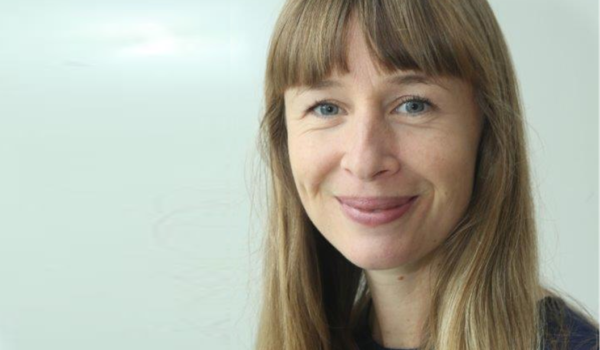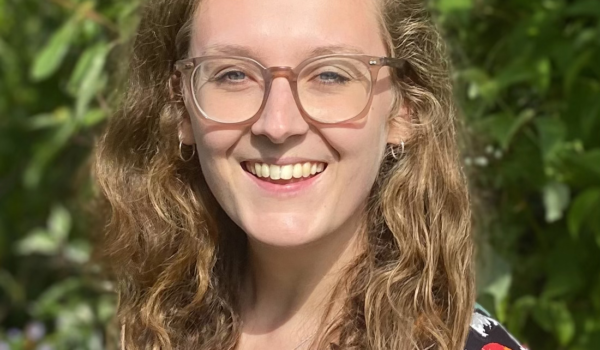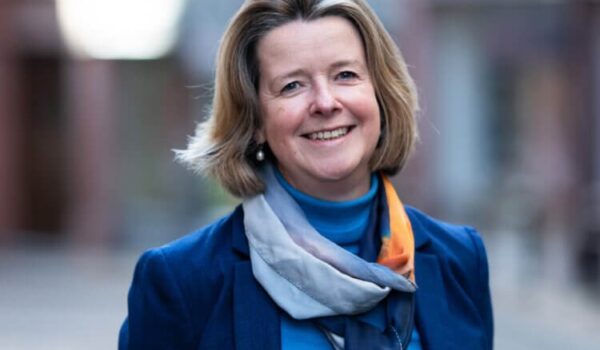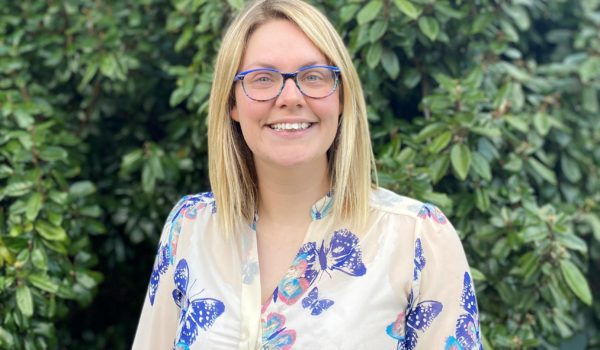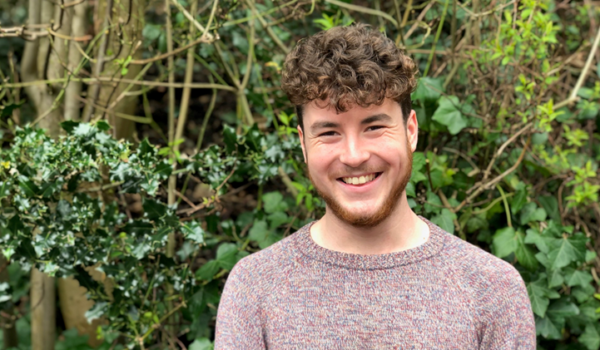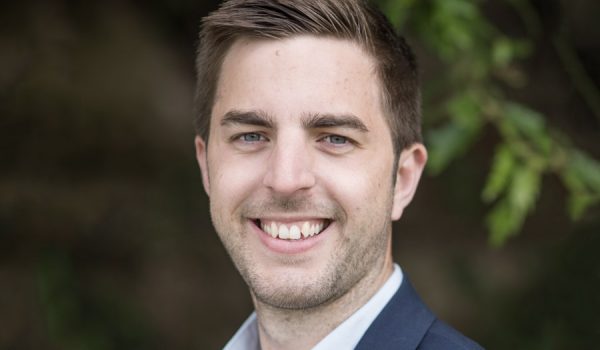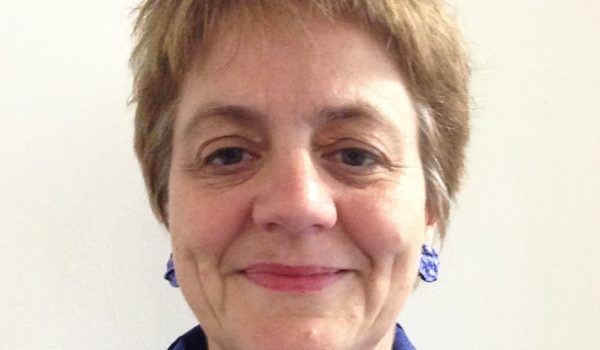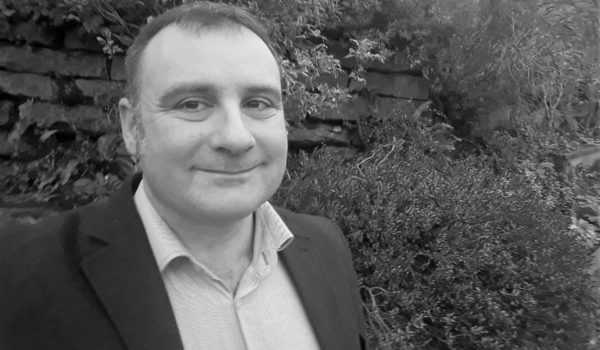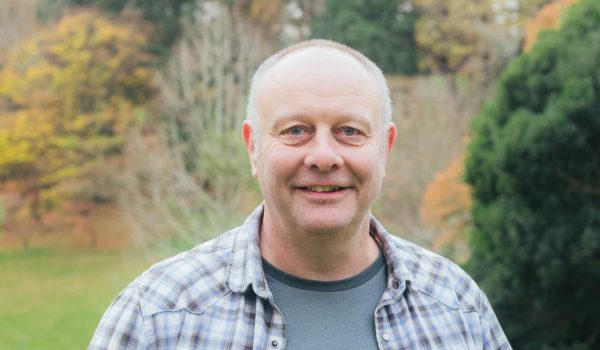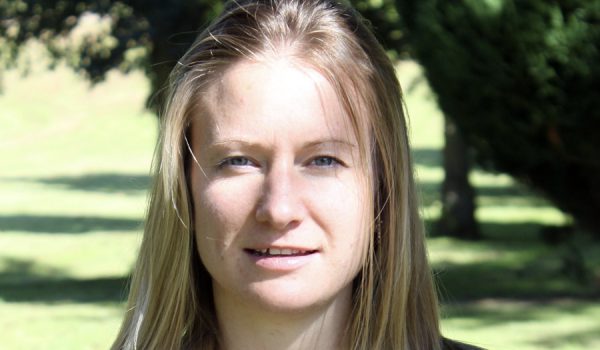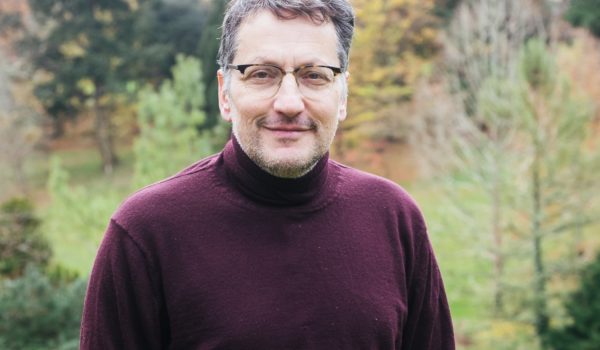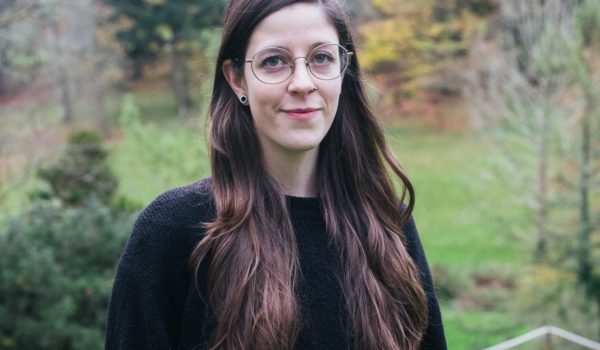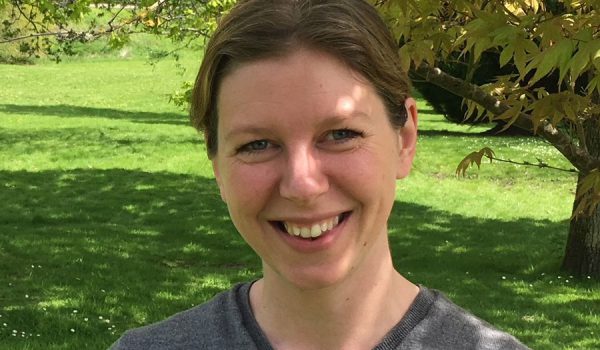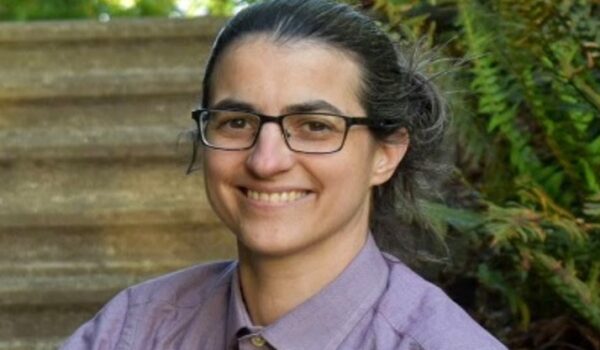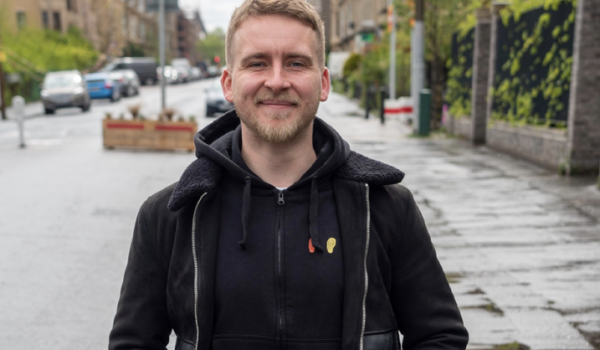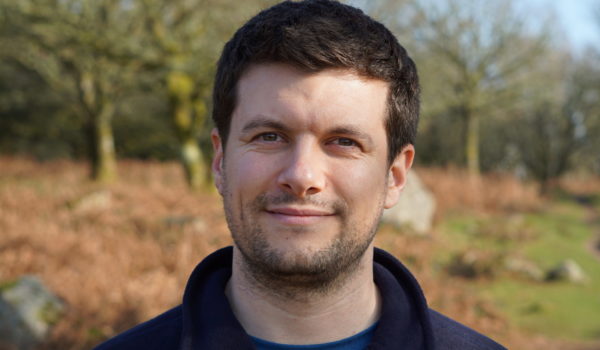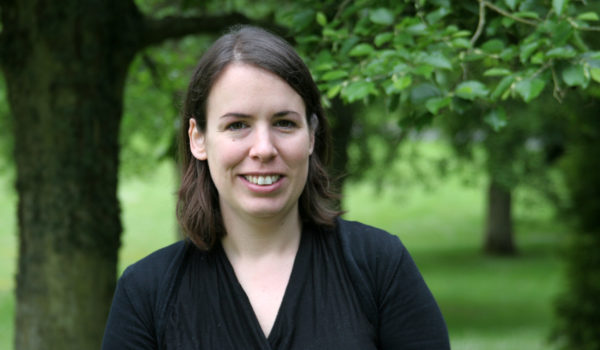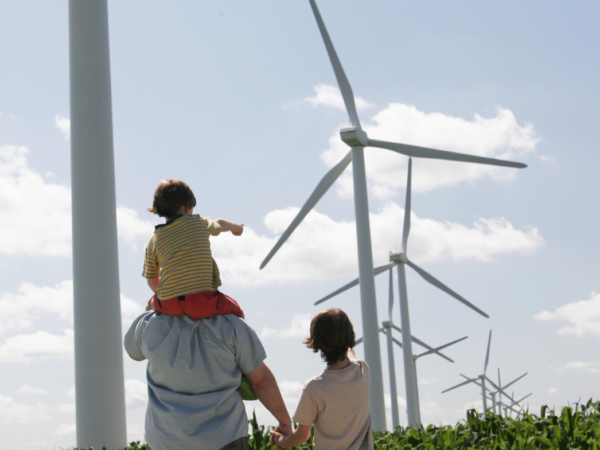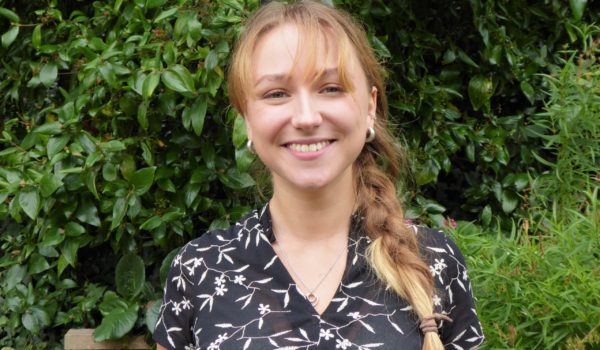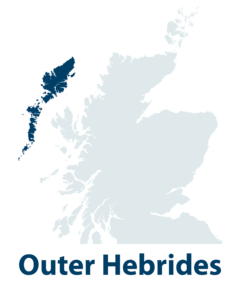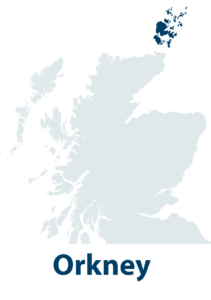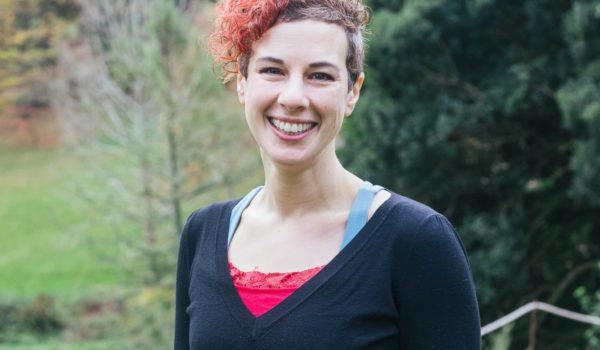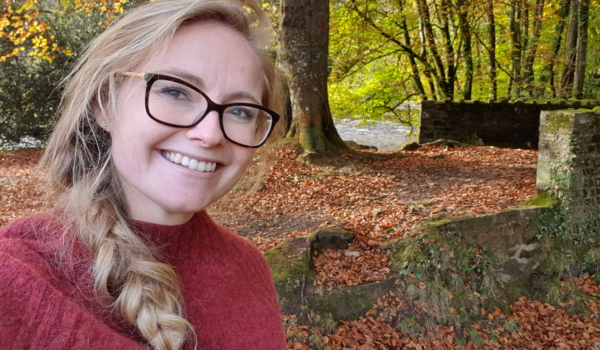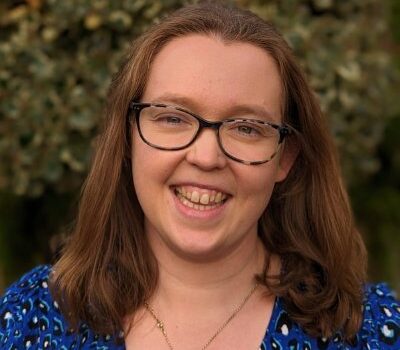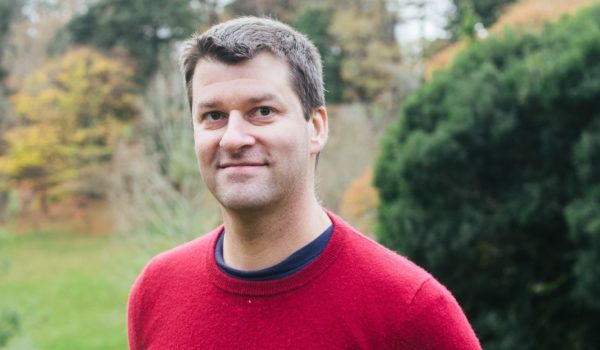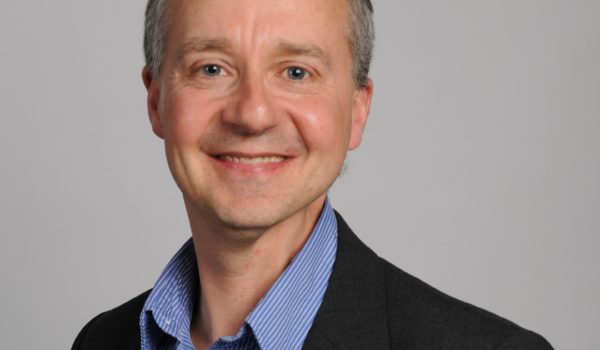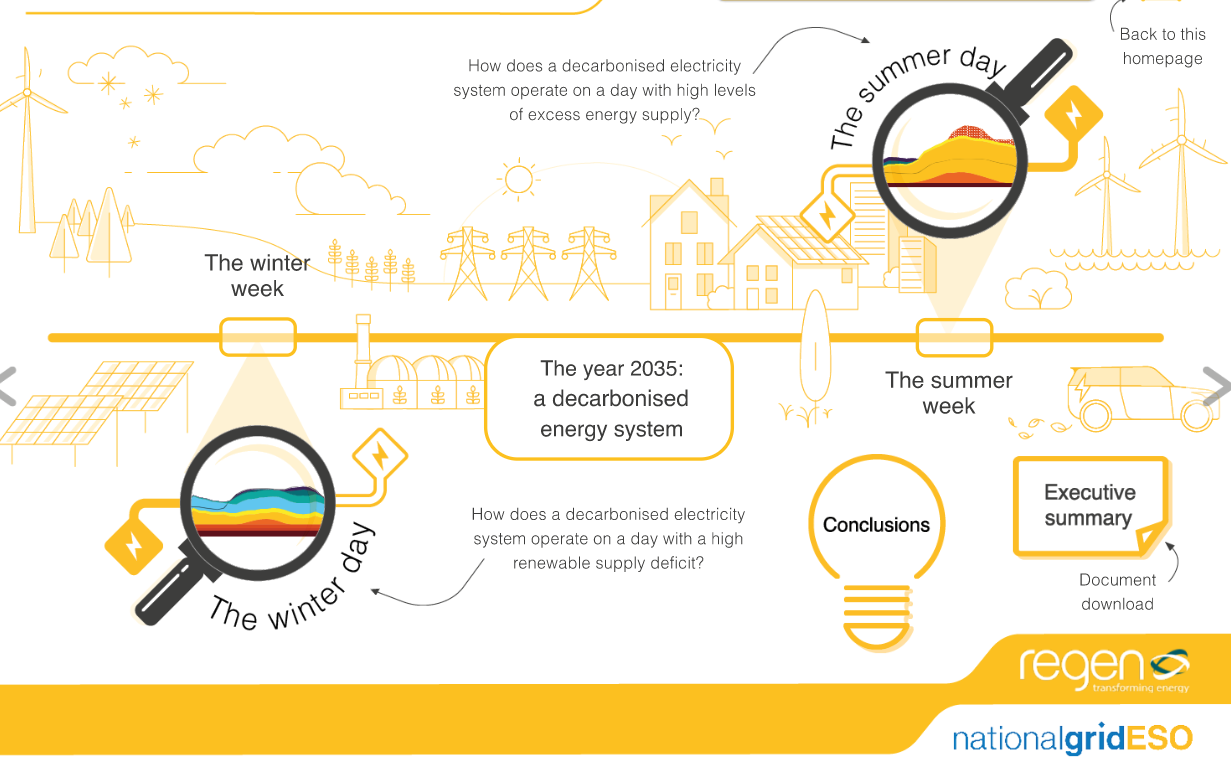Regen led a project to provide the National Grid with insights into the status of its current pipeline, conducted statistical analysis on likely project buildout timeframes, and summarized the results of the RFI project developer survey.
National Grid Transmission Pipeline
National Grid Transmission Pipeline
As part of a process to reform the management of the electricity network connection queue in GB, the ESO are seeking to implement new requirements for developers currently holding accepted connection offers with transmission and distribution network companies. These requirements will require developers to provide evidence of spatial planning status and land rights. ESO have issued a Request for Information (RFI) to all contracted connection holders, which is due to close to responses on 28th June 2024. ESO has been asked by DESNZ and Ofgem to assess the impact of implementing these reforms on the existing project pipeline.
Regen’s experience in researching contracted generation and storage project pipelines, including delivering Distribution Future Energy Scenarios (DFES) analysis for National Grid Electricity Distribution, Scottish and Southern Electricity Networks and battery pipeline analysis for UK Power Networks, has provided a firm foundation to undertake a similar workstream for the National Grid ESO (soon to be NESO).
This project, completed to demonstrate the need for reforming the connections queue, was carried out through three work packages:
- An assessment of the planning status of the pipeline of projects seeking to connect to the transmission network (this will complement a wider direct enquiry process ESO will be undertaking with project developers, asking for information on development status, timelines and land rights/lease information).
- An analysis of the historical timescale for developers to convert submitted planning applications or planning approval notices, to build-out.
- A review of the responses ESO has received to the RFI and any insights or recommendations about how to consider the responses and overall sensitivity of the level of response received.
People on this project
Ray Arrell
Andrew Barry
Tamar Bourne
Andrew Brand
Ellie Brundrett
Jo Butlin
Christine Chapter
Robbie Evans
Becky Fowell
Olly Frankland
Maxine Frerk
Simon Gill
Johnny Gowdy
Rachel Hayes
Jonty Haynes
Holly Hoban
Frank Hodgson
Merlin Hyman
Tamsyn Lonsdale-Smith
Poppy Maltby
George Middlemiss
Grace Millman
Meagan Reasoner
Fraser Stewart
Prina Sumaria
Patti S
Alex Temple
Joel Venn
Charlotte Wason
Hazel Williams
Regen is supporting the National Infrastructure Commission with analysis for its study into the electricity distribution network.
Project duration: April to October 2024
Project lead: Frank Hodgson, senior energy analyst
Project director: Johnny Gowdy, director
The National Infrastructure Commission (NIC) is carrying out a study to provide government with recommendations on the policy, regulatory and governance changes needed to make the distribution network in Great Britain fit for net zero.
The distribution network delivers power to homes and businesses across the country across over almost a million kilometres of power lines and around 600,000 substations. It connects to the electricity transmission network which transports power over longer distances.
The requirements of the distribution network are set to materially change as electricity increasingly provides more of our energy for heating and transport including the uptake of millions of heat pumps and electric vehicles, rooftop solar and other low carbon technologies.
In this project Regen, in partnership with EA Technology Ltd, are providing the NIC with research, analysis and modelling to support their study. This will include analysis of future network capacity requirements to achieve a net zero scenario, with a number of sensitivities, which can be used assess the scale of investment required in a range of network and non-network solutions.
Regen and EA Technology Ltd will not providing policy recommendations to the Commission in this project.
More information on the National Infrastructure Commission’s study can be found here.

People on this project
Ray Arrell
Gareth Miller
Bruce Bardsley
Tamar Bourne
Andrew Brand
Ellie Brundrett
Jo Butlin
Christine Chapter
Robbie Evans
Becky Fowell
Olly Frankland
Maxine Frerk
Simon Gill
Johnny Gowdy
Rachel Hayes
Jonty Haynes
Holly Hoban
Frank Hodgson
Merlin Hyman
Tamsyn Lonsdale-Smith
Poppy Maltby
George Middlemiss
Grace Millman
Meagan Reasoner
Fraser Stewart
Prina Sumaria
Patti S
Alex Temple
Joel Venn
Charlotte Wason
Sophie Whinney
Hazel Williams
Regen has worked with the Energy Networks Association’s DNO group to explore the potential interactions and integration between Distribution Network Operator (DNO) processes and proposed Regional Energy Strategic Planner (RESP) functions. This project aims to provide constructive input to the future design and function of the RESPs, focused on the interaction between RESPs and DNOs.
Project duration: January 2024 – July 2024
Project lead: Jonty Haynes, principal analyst
Project aims
The purpose of this project is to provide constructive input to the future design and function of the Regional Energy Strategic Planners (RESPs), focused on the interaction between RESPs and Distribution Network Operators (DNOs).
To develop this report, Regen has worked with the ENA DNO group to understand current DNO network development processes and explore the potential interactions and integration between DNO processes and proposed RESP functions. Input from the DNO group has been obtained through interviews, Requests for Information and roundtable discussions. Report recommendations have been compiled by Regen, with review and input from the ENA DNO group members.
While there are a range of views and priorities across GB’s DNOs, this report reflects a consensus among the DNO group.
Outcomes
The outcome of the project will be published in July in the form of a short report. The report is set to make a number of recommendations that would enable the RESPs to efficiently add value to the DNO network development process and wider regional energy planning activities, with suggestions as to how the DNO and RESP work practices could evolve together. It will also identify functions that should remain within the DNOs’ remit to maintain clear accountabilities, avoid duplication of efforts and make best use of existing DNO capabilities and knowledge.
It is hoped that this report will add to the ongoing RESP design development and inform further discussion within the RESP stakeholder group.
People on this project
Ray Arrell
Gareth Miller
Bruce Bardsley
Andrew Barry
Tamar Bourne
Andrew Brand
Ellie Brundrett
Jo Butlin
Christine Chapter
Robbie Evans
Becky Fowell
Olly Frankland
Maxine Frerk
Simon Gill
Johnny Gowdy
Rachel Hayes
Jonty Haynes
Holly Hoban
Frank Hodgson
Jessica Hogan
Merlin Hyman
Tamsyn Lonsdale-Smith
Poppy Maltby
George Middlemiss
Grace Millman
Meagan Reasoner
Fraser Stewart
Prina Sumaria
Patti S
Alex Temple
Joel Venn
Felicity Vivian
Charlotte Wason
Sophie Whinney
Hazel Williams
NGED Distribution Future Energy Scenarios
Regen has been working with National Grid Electricity Distribution since 2015 to deliver the annual Distribution Future Energy Scenarios (DFES) assessments to guide distribution network planning.
Project duration (2024 iteration): April 2024 – December 2024
Project lead: Grace Millman, Senior Energy Analyst
The context: distribution network planning
To meet the UK’s carbon reduction targets, the energy system will undergo substantial change, from major wind, solar and energy storage projects down to heating and transport for individual households. In order to plan for this energy system evolution, Regen and National Grid Electricity Distribution (NGED) have worked together since 2015 to produce annual Distribution Future Energy Scenarios (DFES) for each of NGED’s four licence areas. Now an annual process for each Distribution System Operator (DSO), each DFES builds on the analysis and engagement undertaken over the previous years.
What is DFES?
The scenarios cover distribution-connected generation and storage, from solar and wind farms to gas-fired generation and batteries, alongside key sources of energy demand such as electric vehicles, heat pumps, new housing developments and hydrogen electrolysers, within the framework of the National Grid ESO Future Energy Scenarios (FES).
The DFES process helps NGED to understand:
- What technologies will connect and/or disconnect from its network out to 2050.
- How much installed capacity of each technology will connect under four future societal and technological scenarios.
- When this capacity could come online and begin supplying and/or consuming electricity.
- Where across NGED’s licence areas these technologies will likely connect.
NGED uses the outputs of the DFES modelling to determine the potential impacts of new development on the distribution network, to provide an evidence base to support future network reinforcement and investment, and to identify opportunities for the use of non-network solutions such as storage and flexibility services. For key low-carbon technologies, a more detailed, granular analysis is completed as part of the DFES assessment, producing street-level future scenario projections on the low voltage network, for electric vehicles (EVs), EV chargers, heat pumps, rooftop solar and domestic battery storage.
How are stakeholders engaged?
The DFES is heavily underpinned by input from local stakeholders. As part of this annual engagement, Regen delivers a series of interactive webinars outlining the overall thinking and approach to DFES analysis. The team uses interactive software online polling platform – Menti – to gauge views on the uptake of new or disruptive future energy technologies, testing some of the assumptions used in the DFES modelling and to explore some of the regional characteristics for the NGED licence areas that may align with, or diverge away from, national trends.
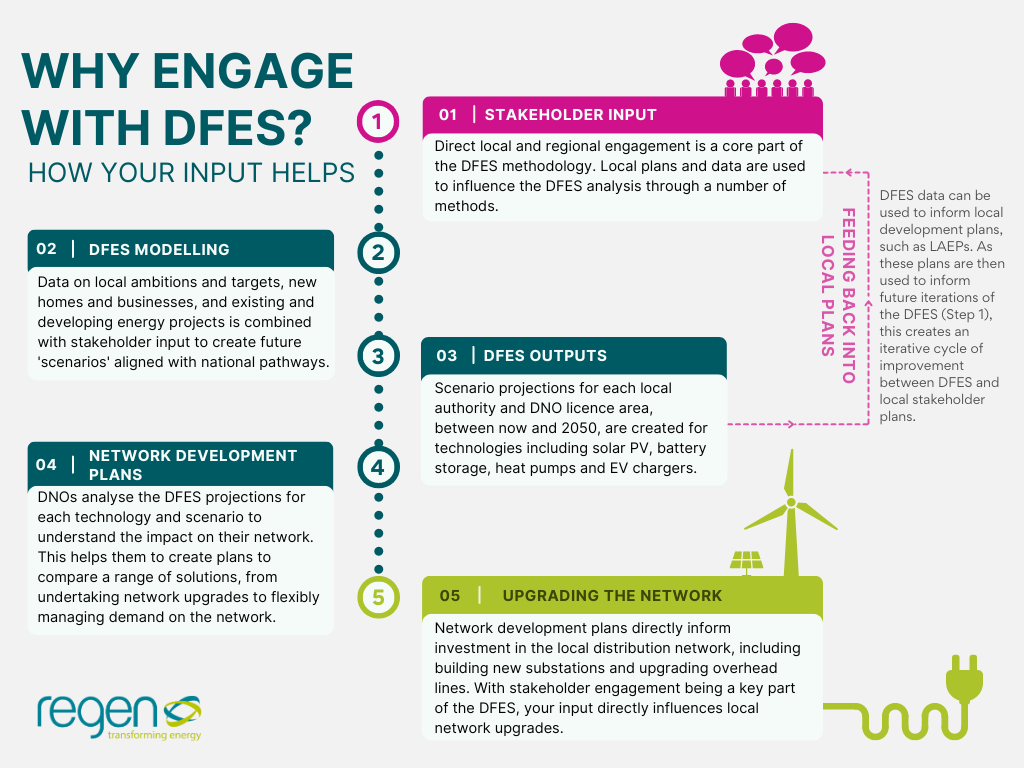
DFES 2024
NGED and Regen are currently undertaking the 2024 iteration of the DFES which looks at a set of possible future scenarios for the uptake of key energy technologies out to 2050. Over the coming months, we will be engaging local authorities, regional decision-makers, project developers, asset owners, energy consumers, community energy groups and trade bodies to develop bottom-up, stakeholder-led regional future scenarios to inform NGED’s network planning and investment. You can sign up for the stakeholder consultation events here and reach out via email if you would like to part of our wider DFES engagement.


The outputs of our previous DFES analyses are published on National Grid’s website here.
People on this project
Ray Arrell
Gareth Miller
Bruce Bardsley
Tamar Bourne
Andrew Brand
Ellie Brundrett
Jo Butlin
Christine Chapter
Robbie Evans
Becky Fowell
Olly Frankland
Maxine Frerk
Simon Gill
Johnny Gowdy
Rachel Hayes
Jonty Haynes
Holly Hoban
Frank Hodgson
Merlin Hyman
Tamsyn Lonsdale-Smith
Poppy Maltby
George Middlemiss
Grace Millman
Meagan Reasoner
Fraser Stewart
Prina Sumaria
Patti S
Alex Temple
Joel Venn
Charlotte Wason
Sophie Whinney
Hazel Williams
Regen supported National Grid Electricity Distribution to understand the priorities of National Grid’s customers and the potential market for the innovative Take Charge substation design.
Project duration: December 2023 – March 2024
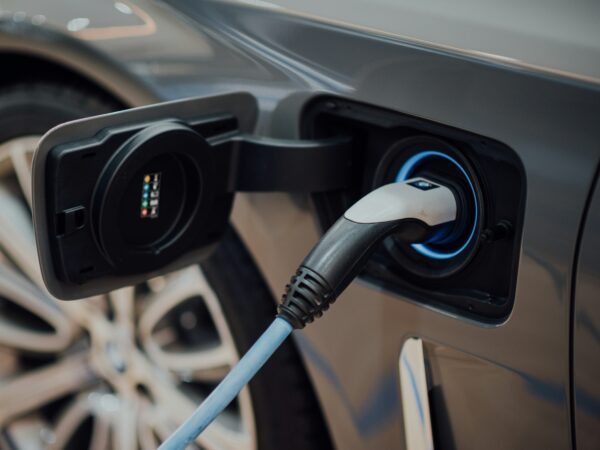
The context: Take Charge
National Grid Electricity Distribution recently undertook a successful innovation project ‘Take Charge’, designing and installing a compact primary substation at Exeter Services to support Moto Services’ EV charging requirements. In the long term, there is the potential for standardised, modular and compact primary substations to deliver large amounts of capacity from the distribution networks.
The project
In support of this work, Regen carried out a select number of interviews on behalf of National Grid to understand the priorities of National Grid’s customers and the potential market for new substation designs. This customer engagement, building on Regen’s ongoing work to deliver National Grid’s Distribution Future Energy Scenarios, is supporting a wider project focused on rolling out and commercialising the innovative Take Charge substation.
We explored EV charging, heat networks, data centres and maritime decarbonisation, sharing the results of the work with National Grid in the form of an independent report.


People on this project
Ray Arrell
Tamar Bourne
Andrew Brand
Ellie Brundrett
Jo Butlin
Christine Chapter
Robbie Evans
Becky Fowell
Olly Frankland
Maxine Frerk
Simon Gill
Johnny Gowdy
Rachel Hayes
Jonty Haynes
Holly Hoban
Frank Hodgson
Merlin Hyman
Tamsyn Lonsdale-Smith
Poppy Maltby
George Middlemiss
Grace Millman
Meagan Reasoner
Alex Robertson
Fraser Stewart
Prina Sumaria
Patti S
Alex Temple
Joel Venn
Charlotte Wason
Hazel Williams
Hebrides and Orkney – Future Load Growth Investigation
Regen has been working with Scottish and Southern Electricity Networks (SSEN) to collate evidence on the future electricity load growth on the Outer Hebrides, Inner Hebrides and Orkney. This work will help SSEN to better understand what investment is needed in the islands’ electricity networks, including the subsea cables that connect them to the mainland.
Project duration: October 2023 – February 2024
Project lead: Becky Fowell, Energy Market Analyst
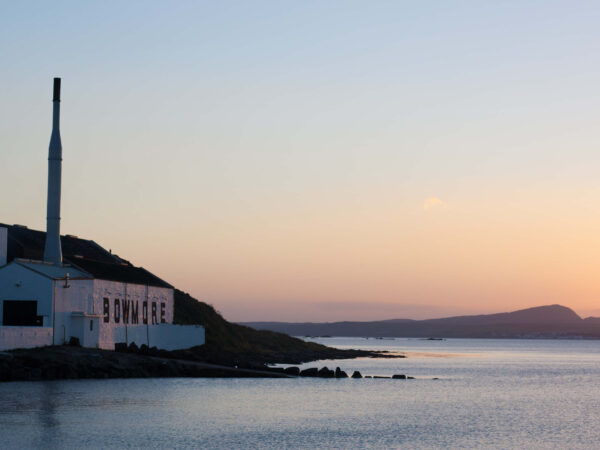
Within their RIIO-ED2 business plan, Scottish and Southern Electricity Networks (SSEN) identified the need to replace or strategically reinforce 15 subsea cables that currently connect various Scottish islands to the mainland. Funding for these cables is being explored through SSENs Hebrides and Orkney Whole System Uncertainty Mechanism (HOWSUM) programme of work, which is being assessed across 2024 and 2025.
The evidence cases for these island groups builds on Regen’s ongoing work to deliver SSEN’s annual Distribution Future Energy Scenarios (DFES) assessments for their North of Scotland licence area. They also build on a similar load growth assessment that Regen completed for the Isle of Wight, in SSEN’s Southern England licence area.
The evidence cases provide a summary of the existing electricity network and existing network constraints, alongside a summary of the potential future electricity load growth out to 2050, categorised by:
- Distributed electricity generation (and relevant transmission-connected projects)
- Electricity flexibility technologies (battery storage and hydrogen)
- Electrified transport
- Electrified heat
- New property developments
The work also provides insight into additional sources of future electricity load from industries that are not currently included within the DFES technology scope, such as:
- Maritime (ferries and fishing vessels) and aviation decarbonisation
- Significant commercial industries (i.e. whisky distilleries, agriculture, aquaculture)
This study is intended to support SSEN to identify future electricity needs across these Scottish Island groups. This will inform the network investment requirements to enable future uptake of renewable generation and low carbon technologies across the islands, allowing for both net zero and security of supply within the island groups.
SSEN have recently published documentations related to their HOWSUM (Hebrides and Orkney Whole System Uncertainty Mechanism) application on their website.
The evidence cases that Regen has provided for each island group can be found below.

People on this project
Ray Arrell
Mollie Atherton
Gareth Miller
Bruce Bardsley
Tamar Bourne
Andrew Brand
Ellie Brundrett
Jo Butlin
Christine Chapter
Robbie Evans
Rebecca Ford
Becky Fowell
Olly Frankland
Maxine Frerk
Simon Gill
Johnny Gowdy
Rachel Hayes
Jonty Haynes
Holly Hoban
Frank Hodgson
Jessica Hogan
Merlin Hyman
Tamsyn Lonsdale-Smith
Poppy Maltby
George Middlemiss
Grace Millman
Meagan Reasoner
Shona R
Alex Robertson
Hannah Stanley
Fraser Stewart
Prina Sumaria
Patti S
Alex Temple
Joel Venn
Felicity Vivian
Charlotte Wason
Sophie Whinney
Hazel Williams
Rebecca Windemer
Collaborating for local net zero planning and delivery
Regen is working with Energy Networks Association to develop a report looking at how energy networks and local authorities can better collaborate on local net zero planning and delivery.
Project manager: Mollie Atherton

Exploring the various points of interaction between local authorities and energy networks, this project focuses on understanding more about the relationships, processes, technologies and innovations that enable local authorities and networks to share planning information and align local planning with network planning and investment.
The project is the starting point for ongoing work by Energy Networks Association to help drive consistency across how the networks engage with local authorities, particularly about topics like open data, strategic planning, connections and innovation.
Regen has engaged more than 30 local authorities through interviews and workshops to gather their insights about the engagement process and to understand from a local authority perspective what best practice looks like.
The report will be published in December 2023.
People on this project
Ray Arrell
Mollie Atherton
Tamar Bourne
Andrew Brand
Ellie Brundrett
Jo Butlin
Christine Chapter
Tim Crook
Robbie Evans
Becky Fowell
Olly Frankland
Maxine Frerk
Simon Gill
Johnny Gowdy
Rachel Hayes
Jonty Haynes
Holly Hoban
Frank Hodgson
Ian Hutchcroft
Merlin Hyman
Tamsyn Lonsdale-Smith
Poppy Maltby
George Middlemiss
Grace Millman
Meagan Reasoner
Alex Robertson
Fraser Stewart
Prina Sumaria
Patti S
Alex Temple
Joel Venn
Felicity Vivian
Charlotte Wason
Sophie Whinney
Hazel Williams
In 2022, Regen was commissioned by the Welsh Government to produce comprehensive evidence of Welsh energy trends to support the development of energy targets.
Regen has now delivered its evidence to the Welsh Government and the resulting consultation is now underway.
Context: energy targets
The development of challenging interim energy targets is a critical step on the road to net-zero emissions. Tracking and communicating progress against energy targets can help to shape effective policy and market responses towards our net zero commitment. Energy targets can:
- provide clear and measurable goals that create a sense of urgency,
- help focus efforts and resources,
- signal to investors and business.
The project
As an organisation with a mission to support net zero, Regen recognises the importance of challenging energy targets. We therefore enjoyed our work with the Welsh Government to build an evidence base for the development of Welsh energy targets.
Our analysis of Wales’s in-development renewable energy projects and technical energy resources identified that Wales is well equipped to take a leading role in achieving a decarbonised energy system.
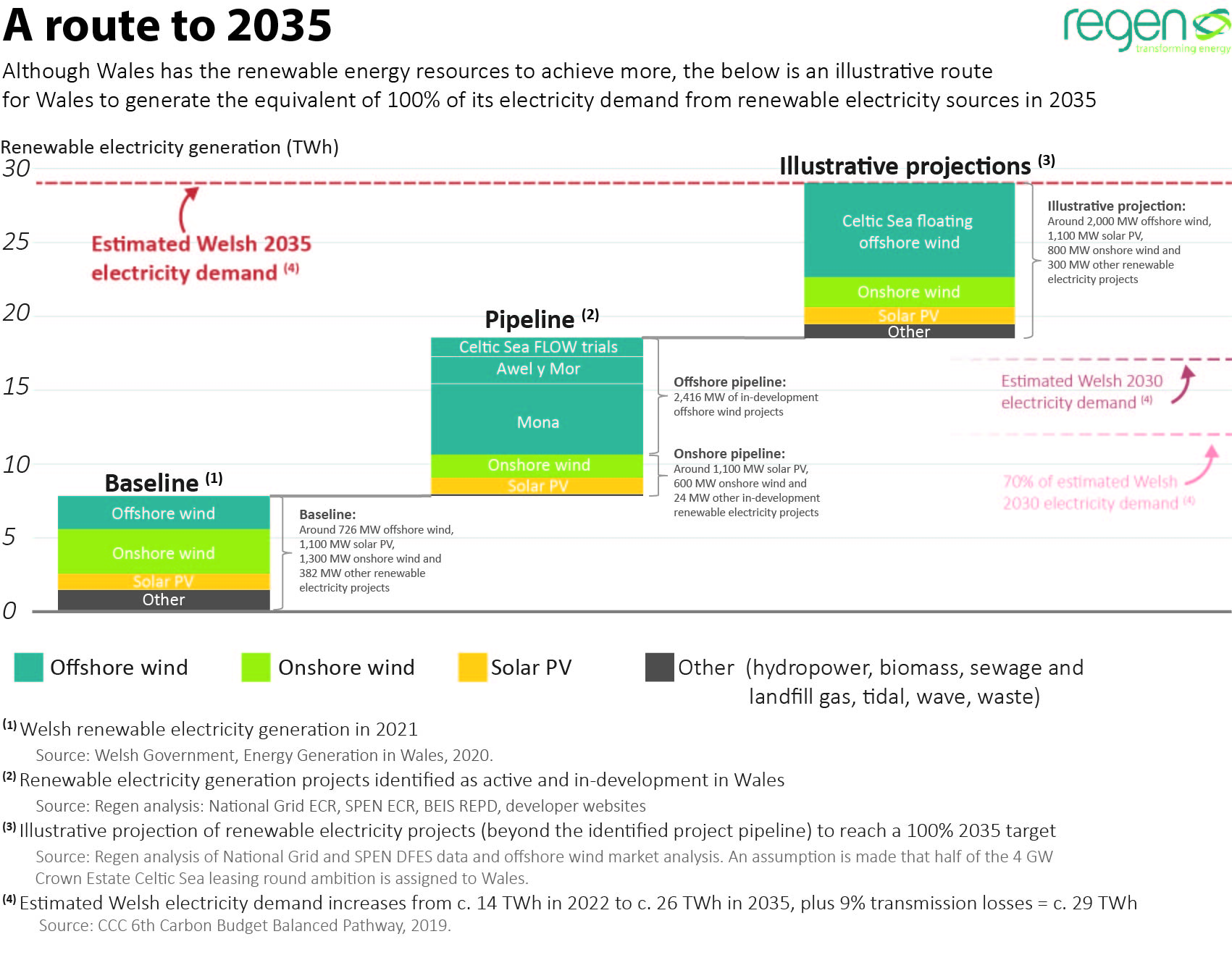
Figure 1: Example route to an illustrative 2035 target of generating the equivalent of 100% of Wales’ electricity demand from renewable electricity sources.
The Welsh Government is now consulting on its plans for future targets. Based on Regen’s evidence, the Welsh Government’s proposed targets include:
- a target to meet the equivalent of 100% of Welsh annual electricity consumption from renewable electricity by 2035, and continue to keep pace with consumption thereafter.
- a target for at least 1.5 GW of renewable energy capacity to be locally owned by 2035, excluding heat pumps.
- a target of 5.5 GW heat pumps capacity by 2035, contingent on scaled up support from the UK Government and reductions in the cost of technology.
The proposed Welsh energy targets will require significant investment and collaboration between government, industry, and other stakeholders. Delivery of the targets has the potential to transform the Welsh energy sector, driving the development of technologies and infrastructure, and create opportunities for job creation and economic growth.
The Welsh Government’s consultation on their proposed energy targets is now underway, which, along with Regen’s evidence base, can be read here.
Read more about the project in the Welsh energy targets insights blog below:
The project team
- Joel Venn, head analyst
- Ellie Brundrett, project manager
People on this project
Ray Arrell
Tamar Bourne
Andrew Brand
Ellie Brundrett
Jo Butlin
Christine Chapter
Robbie Evans
Becky Fowell
Olly Frankland
Maxine Frerk
Simon Gill
Johnny Gowdy
Rachel Hayes
Jonty Haynes
Holly Hoban
Frank Hodgson
Merlin Hyman
Tamsyn Lonsdale-Smith
Poppy Maltby
George Middlemiss
Grace Millman
Meagan Reasoner
Fraser Stewart
Prina Sumaria
Patti S
Alex Temple
Joel Venn
Charlotte Wason
Hazel Williams

Ask anyone involved in sustainable energy what the biggest challenge they face is and the chances are they will cite the grid. The Government, Ofgem, the Electricity System Operator and the Network Operators have all set out plans to deliver the investment to support net zero. But is it enough? And what really needs to happen at each level of the electricity system?
Regen is working with MCS Charitable Foundation to demystify the challenge of upgrading the grid to achieve the UK’s decarbonisation and energy security goals.
The project:
The project involves a study of existing evidence including some of Regen’s own analyses. The final output is expected to be a short briefing paper launching in May 2023.
The project team:
Project manager: Frank Hodgson
Project director: Merlin Hyman
People on this project
Ray Arrell
Tamar Bourne
Andrew Brand
Ellie Brundrett
Jo Butlin
Christine Chapter
Robbie Evans
Becky Fowell
Olly Frankland
Maxine Frerk
Simon Gill
Johnny Gowdy
Rachel Hayes
Jonty Haynes
Holly Hoban
Frank Hodgson
Merlin Hyman
Tamsyn Lonsdale-Smith
Poppy Maltby
George Middlemiss
Grace Millman
Meagan Reasoner
Fraser Stewart
Prina Sumaria
Patti S
Alex Temple
Joel Venn
Charlotte Wason
Hazel Williams
Playbook for Network Innovation
In partnership with Innovate UK, Regen has developed the Playbook for Network Innovation to support projects throughout their journey and provide recommendations to shape the UK energy innovation landscape.
Project manager: Grace Millman
Project duration: July 2023 – March 2024
The context: Energy network innovation
Network innovation funding has enabled improvements in efficiency, safety, customer service and resilience. We have seen some big steps forward, such as the testing and roll-out of active network management and flexibility markets. However, a more radical step change is required if we are to meet the net zero challenge.
The innovation landscape has also undergone a significant transformation in the last few years, with new price control periods and changing innovation funding.
The Strategic Innovation Fund
Ofgem and Innovate UK are collaborating on the new Strategic Innovation Fund (SIF), which replaces the Network Innovation Competition (NIC) in the second RIIO price control period. With £450 million available over a five-year period, the vision for the SIF is to enable a ‘giant leap together’ in network innovation, helping to deliver net zero at the lowest cost to consumers by enabling strategic change. Working with other public funders of innovation, the SIF aims to deliver real net benefits to network companies, energy users and consumers, and help the UK become a global hub of energy innovation; a ‘Silicon Valley’ of energy.
The project
Regen’s experience of working with the energy networks and innovators is that they face a number of challenges. This project has conducted a deep dive into previous projects to look for trends related to success and failure. This included looking at when useful learning was generated from the project, whether the innovation was rolled out into business-as-usual and whether a product or service was successfully commercialised.
This has been combined with existing academic research on innovation diffusion to identify targeted recommendations to the innovation community to increase the chances of successful deployment of future innovation projects. By harnessing these invaluable insights, we want to create a powerful resource that will guide innovators, energy networks and their partners as they develop and refine their ideas, craft project applications and embark on their journey of network innovation and successful deployment.
Read the Playbook for Network Innovation here.
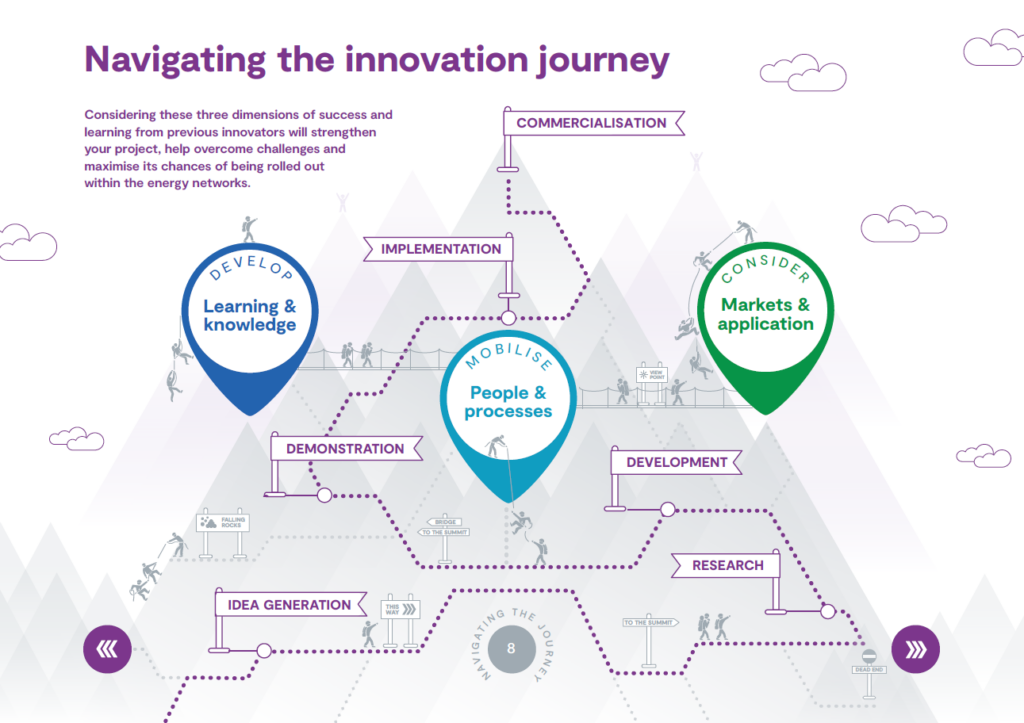
For more information, please reach out to the project lead, Grace Millman, or Regen’s head of innovation, Tamar Bourne.
People on this project
Ray Arrell
Tamar Bourne
Andrew Brand
Ellie Brundrett
Jo Butlin
Christine Chapter
Robbie Evans
Becky Fowell
Olly Frankland
Maxine Frerk
Simon Gill
Johnny Gowdy
Rachel Hayes
Jonty Haynes
Holly Hoban
Frank Hodgson
Merlin Hyman
Tamsyn Lonsdale-Smith
Poppy Maltby
George Middlemiss
Grace Millman
Meagan Reasoner
Alex Robertson
Fraser Stewart
Prina Sumaria
Patti S
Alex Temple
Joel Venn
Charlotte Wason
Hazel Williams
Go West! An analysis of the energy system benefits and policy implications of a more geographically diverse offshore wind portfolio
Launched 19th October 2022.
A huge expansion of offshore wind is coming – the UK is aiming to deliver 50 GW of offshore wind by 2030. To date, almost three-quarters of the UK’s 13 GW offshore wind capacity has been installed along the east coast of Great Britain. However, recent innovations in floating offshore wind have enabled the development of projects in deeper water off the west coast. This presents an opportunity for west coast offshore wind projects to address the lack of geographical diversity of the UK’s offshore wind fleet and to play a vital role in energy system balancing, energy security and price stability.
The Go West! study explores and identifies the benefits that pursuing a more geographically diverse offshore wind fleet could bring to both the UK energy system and energy consumers, and recommends the policy innovations required to deliver such a balanced fleet.
About the project
Project title: ‘Go West – An analysis of the energy system benefits and policy implications of a more geographically diverse offshore wind portfolio’
Project lead: Jack Adkins, Senior Analyst | Project duration: May – October 2022
The paper was jointly sponsored by Simply Blue Group, Magnora Offshore Wind, Morwind and Northland Power (with Regen retaining editorial independence over recommendations and conclusions) and has been informed by engagement with key energy sector stakeholders, including National Grid ESO, BEIS, Ofgem, Welsh Government, The Crown Estate, rUK and the CCC.
This paper was born of an early analysis by Regen director Johnny Gowdy of a particularly interesting weather weekend in December 2021, where low wind across the East coast resulted in several days of very low wind generation, whilst high wind resource across the West coast remained untapped that could have mitigated high wholesale price volatility and system balancing costs.
For the Go West study, Regen has modelled several possible future 70 GW offshore wind fleets with varying capacity on the west coast of Great Britain – from the ‘Stay East’ scenario with just 3GW on the west coast, to the ‘Go West!’ scenario with 35GW on the west coast to complement east coast generation.
Using 20 years of wind resource data, the report assesses potential system benefits such as reduced occurrence and duration of low offshore wind power, reduced power generation volatility, and associated potential reductions in energy system costs and carbon emissions.
For more information, please contact Jack Adkins, Senior Analyst at Regen.
People on this project
Ray Arrell
Gareth Miller
Bruce Bardsley
Tamar Bourne
Andrew Brand
Ellie Brundrett
Jo Butlin
Christine Chapter
Robbie Evans
Becky Fowell
Olly Frankland
Maxine Frerk
Simon Gill
Johnny Gowdy
Rachel Hayes
Jonty Haynes
Holly Hoban
Frank Hodgson
Merlin Hyman
Tamsyn Lonsdale-Smith
Poppy Maltby
George Middlemiss
Grace Millman
Meagan Reasoner
Fraser Stewart
Prina Sumaria
Patti S
Alex Temple
Joel Venn
Charlotte Wason
Hazel Williams
A day in the life of 2035 – a vision of our decarbonised electricity system
The UK government has set an explicit target to achieve a decarbonised electricity system by 2035. But what does this mean, and what might that look like on a day-to-day basis? In particular, how might this decarbonised electricity system operate during the more challenging periods of the year?
Project duration: December 2021 – October 2022
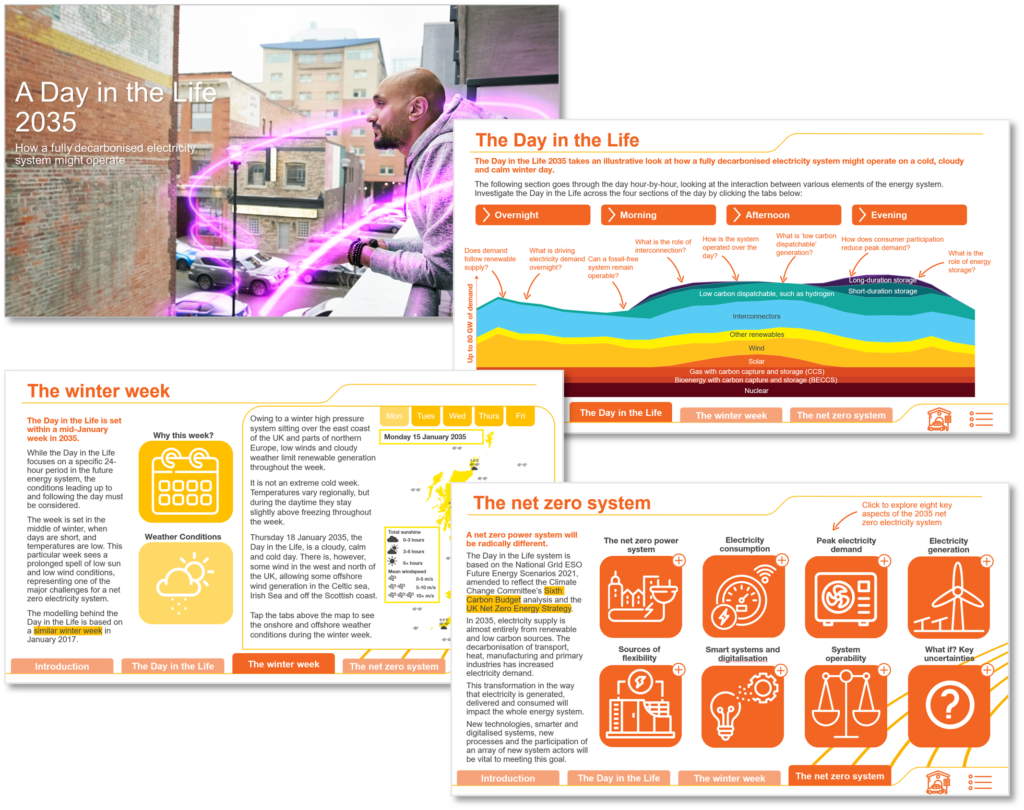
To address the challenge of how a decarbonised power system could operate during challenging periods of the year, Regen worked alongside National Grid ESO’s Bridging the Gap programme to produce ‘A day in the life of 2035’. The project asks: How will a very low carbon electricity system, with a very high proportion of variable renewable energy, significant new demand from EVs and heat pumps, and much greater levels of flexibility, remain flexible enough to deal with the diverse conditions that the British weather and energy system will throw at it?
We looked at the specific pieces of the puzzle needed to achieve a decarbonised electricity system by 2035, including:
- How much offshore wind will be located in the various seas around the UK coast
- What technologies and fuels will provide low carbon flexibility and dispatchable generation
- The role of overseas interconnection
- How domestic and non-domestic consumers engage in an increasingly digitalised and data-driven energy system.
In early 2022 we published the first report illustrating how a 2035 decarbonised electricity system may operate on a challenging day in winter with high demand and low availability of renewables.
We have now published the second edition, which adds a summer’s day with significant excess renewable energy. This means finding ways of keeping the system secure and stable when demand is low and the availability of wind and solar is high. Traditionally much of the system’s stability services and its ability to respond to unexpected faults has been provided by fossil fuel generation – by 2035 we need those services, as well as our energy, to come from zero carbon sources.
The report
Click below to view the final report
This analysis was published 13 October 2022.
First edition
This publication was launched in March 2022 alongside National Grid ESO’s Bridging the Gap programme.. The analysis has been integrated into the second edition released in October 2022. With particularly high levels of interest in the project, we hosted a Q+A session to discuss some of the assumptions and uncertainties. A recording of the session can be found here.
View the first edition of the report here
- If you are interested in finding out more about this project or our future energy systems work, please contact Jonty Haynes.
- To stay up to date with the launch of Regen’s publications and other market insight, sign up to our mailing list here.



